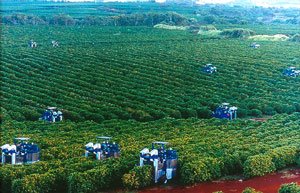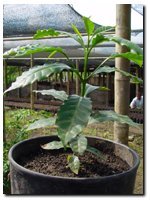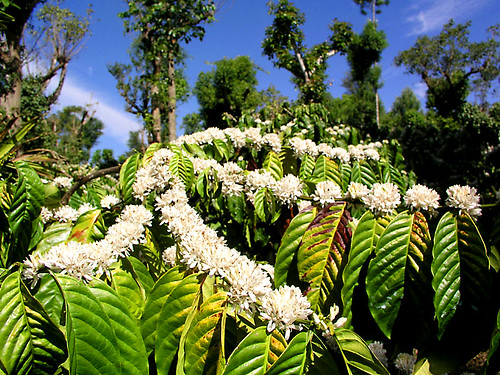Sunday, May 28, 2006
Saturday, May 27, 2006
Soil in Context
 I'm currently reading the classic text on Organic farming called (interestingly enough) Organic Farming edited by Ray Wolf from Rodale Press. The thing that has been striking me the most is the dichotomy of views on soil health between commercial and organic faming techniques.
I'm currently reading the classic text on Organic farming called (interestingly enough) Organic Farming edited by Ray Wolf from Rodale Press. The thing that has been striking me the most is the dichotomy of views on soil health between commercial and organic faming techniques.Commercial agriculture looks at farming strictly in terms of nutrient inputs and crop yields by weight. The idea of facilitating a plant's ability to grow in-health so that it will provide a crop in return has been all but forgotten in the 'modern' ag industry. Plants are supplied with the nutrients they require, not from the soil itself but from carefully (sometimes) proportioned application of raw chemical foods added directly to the plants. This method focuses solely on the plant itself and takes little or no account of the health of the soil.
In an average organically farmed acre of land there is 11 tons of living material (worms, fungus, nematodes, bacteria,etc.). An acre of chemically farmed land can have as little as 2 tons. Obviously, commercial agriculture throws off the natural balance of the ecosystem IN the soil.
What does this mean for the operation of the farm? Typically it creates the need for more chemical application in order to compensate for the lack of nutrients being created (no new humus being added). And so the vicious cycle begins. After years, the soil cannot support the crops and more and more chems. must be added to get the yields required to pay, not only for general production costs, but for the expensive fertilizers and pesticides that the farm is now dependent on. Not too sustainable huh?

When you look at crops as units that need 'such and such' amount of nitrogen and 'xyz' amount of whatever chemical, the RELATIONSHIP between the grower and the grown is severed into a onesided project with no communication between the farmer and the flux of the process of growing itself. The result is that the context of farming has disappeared or become a barren shell. The soil shares the same fate. The earth into which a plant is placed becomes nothing better than a plastic pot.
This same mentality, tragically finds its way into the rest of the coffee industry as well. It is often seen in the coffee roasting world. Many coffee roasters see their beans as units to be 'applied' to their roaster (machine). The advent of 'profile roasting' has been a wonderful boost to the craft of roasting. But while providing highly valuable 'navigation' tools, it has also provided an opportunity for some roaster's to believe that they can completely quantify the roasting process. "X bean grown at Y altitude from Z cultivar with 12.34% moisture and whatever density, ALWAYS means drop at this time and cut heat here and here.......... "
Is the relationship gone? If a roaster denies that there is something ineffable, esoteric, even mystical in the craft of roasting coffee have they lost their way?
This same mentality, tragically finds its way into the rest of the coffee industry as well. It is often seen in the coffee roasting world. Many coffee roasters see their beans as units to be 'applied' to their roaster (machine). The advent of 'profile roasting' has been a wonderful boost to the craft of roasting. But while providing highly valuable 'navigation' tools, it has also provided an opportunity for some roaster's to believe that they can completely quantify the roasting process. "X bean grown at Y altitude from Z cultivar with 12.34% moisture and whatever density, ALWAYS means drop at this time and cut heat here and here.......... "
Is the relationship gone? If a roaster denies that there is something ineffable, esoteric, even mystical in the craft of roasting coffee have they lost their way?
If soil health is the context in which a plant grows what is the equilvalent context in which a bean is roasted?
Profiling, record keeping, research, logging, charting, graphing, input, output. All of these things can help create the ultimate quality coffee (on the farm or in the roaster) but they must be used to facilitate the relationship-the interaction-the process. The science should serve the craft; the craft should not serve the science.
links:
one two three
Friday, May 19, 2006
Coffee and Worms...mmmmmmmm.

 At the recent SCAA Convention, I was really excited to hear about some progressive organic farming techniques being used by coffee farmers around the world. In a class on Coffee Farming lead by Geoff Watts, David LaRoche, and Peter Baker there was some interesting discussion about the use of different types of composting. Coffee farmers are beginning to build experience using alternatives to pesticides and herbicides. Some of the systems being implemented are the use of various proportion of composted material derived from the coffee plant itself called Bokashi.
At the recent SCAA Convention, I was really excited to hear about some progressive organic farming techniques being used by coffee farmers around the world. In a class on Coffee Farming lead by Geoff Watts, David LaRoche, and Peter Baker there was some interesting discussion about the use of different types of composting. Coffee farmers are beginning to build experience using alternatives to pesticides and herbicides. Some of the systems being implemented are the use of various proportion of composted material derived from the coffee plant itself called Bokashi.Growers are realizing that much of the nutrient needs of a plant can be derived from using various proportions of different by-products of the coffee milling process. Pulp, parchment, leaves, anything that comes from the tree can be added back to the soil to maintain the optimum balance of nutrients. The more energy and research done into looking for non-chemical alternatives to plant maintenence the better the results in the cup.
Besides the obvious benefits to the soil, plants, animals, and people of not using pesticides, growers are realizing that the land will provided most if not all of what is necessary to grow the very highest quality coffee...for free. The discovery of ways to improve cup quality without great expense is truly the cutting edge of 'fair trade'. For a farmer to increase the quality of their green through proper farming, milling, and storage techniques without substantial monetary investment is really a huge step forward toward sustainability. This is what organic agriculture is all about.
One of the most interesting and promising of these methods is the use of worms. Using worms to enhance the health of the soil is not a new idea but it has seen limited use in coffee production. It seems that the benefits of using worms to generate nutrient-rich soil and aerate packed earth is beginning to catch on. Worms are used in the earth itself and also in various types of compost to enhance nutrients and to even create 'worm juice', a highly concentrated compost liquid that is like gold for a coffee plant. This is just another example of some of the exciting advances that are now being embraced and appreciated in producing countries.
Check out this great blog from the Finca Project in Costa Rica where they are actively using worms as a part of their growing operation.
links
one
Saturday, May 13, 2006
Wednesday, May 10, 2006
On Whole Quality
 I was having a discussion with an Environmental Studies Master's student the other day about how the FT and OG coffee movements have impacted the overall coffee industry. The shocking (for her)truth is that FT/OG and even Specialty Coffee is just a drop in the ocean when it comes to making significant impact on the day to day function of the commercial coffee world. One pont I attempted to make was that quality is hardly on the map for the largest coffee roasters (and consumers). The coffee industry is still very intrenched in the coffee=caffeine mentality. Viewing coffee as some sort of energy input means that the resources put into developing the industry are focused on increased production (plant density, disease resistence, limiting waste, etc.) not increasing quality. When the idea of quality was raised it brought up some interesting issues.
I was having a discussion with an Environmental Studies Master's student the other day about how the FT and OG coffee movements have impacted the overall coffee industry. The shocking (for her)truth is that FT/OG and even Specialty Coffee is just a drop in the ocean when it comes to making significant impact on the day to day function of the commercial coffee world. One pont I attempted to make was that quality is hardly on the map for the largest coffee roasters (and consumers). The coffee industry is still very intrenched in the coffee=caffeine mentality. Viewing coffee as some sort of energy input means that the resources put into developing the industry are focused on increased production (plant density, disease resistence, limiting waste, etc.) not increasing quality. When the idea of quality was raised it brought up some interesting issues.I have seen some discussion in the forums about what quality means in coffee. The obvious first answer is cup quality. There are plenty of roasters and shop owners who will stomp their feet and declare that cup quality should be the only consideration when looking at coffee. Some people don't give a damn what process resulted in the excellent coffee they recieve; they just care about excellent, cup-quality coffee.
I see this 'cup only' mentality as reactionary. These folks are riding the pendulum swing all the way to the other side. 'Cup quality by any means necessary' is as short-sighted as 'production volume by any means necessary'. Neither of these views is sustainable. Are you willing to have a great cup at any cost? I am not.
To me, quality in coffee must consider all of the elements that come together to create a harmony of quality: whole quality. For a coffee to have 'whole quality', the processes themselves must be of the highest quality- agronomic, milling, storage, economic, social, environmental, shipping, roasting, grinding, brewing. It's easy to just focus on the tangible processes, but what about the processes that are more difficult to quantify (or market)? A coffee is more than a material good isn't it?
I hear all the time, people talking about the 'mystical' qualities of a great cup. The certain ineffible, esoteric cup or the godshot. Some folks can attach poetic descriptors that make you think they've had some kind of spiritual transformation (they may have) while cupping. I fully agree that coffee has the ability to exist in this 'spiritual' realm. But if it does, and a coffee is 'beautiful'-'delicate' does the way in which it got to you not matter?
A cup of coffee does not exist in a vacuum. Every cup has a history, a context; the quality of that history IS the quality of that cup, NOT the other way around.
Quality in each of the aspects of the coffee chain carry their own momentum. The drive for quality across the board: whole quality, increases the quality in each of the coffees individual aspects-growing,milling,roasting, etc.
Too much focus on the quality of any single aspect (volume or cup or environmental or social) creates an imbalance that must be compensated for in another area, thereby diminishing that aspect's quality and therefore the whole quality.
Now, none of this discussion is meant, in any way, to downplay the importance of cup quality. Without quality, the highest quality, in the cup we are just spinning our wheels. I see the goal of 'sustainable coffee' as: striving for ultimate quality in the cup...sustainably. All aspects of coffee are interdependent, they all affect each other. This idea is at the center of some of the best coffee around right now. Stumptown, Intelly, COE, CCC, et al. have embraced this idea to one extent or another and the proof is in the cup.
Can you taste whole quality at the cupping table? I can. I can't help it.
Wednesday, May 03, 2006
The origins of immigrants
 Peter Guiliano had a great post the other day on PF.net called "A Cup Without Immigrants". His observations about immigrants in the coffee world got me thinking about all of the various components that must come together for us in the coffee industry to do what we do. Coffee is truly an international substance. From growing to milling to shipping to roasting to brewing, the wealth of knowledge that has been built-up over the years has resulted in an alchemy of wisdom and experience that could not exist if it wern't for the bits and pieces of input from disparate sources.
Peter Guiliano had a great post the other day on PF.net called "A Cup Without Immigrants". His observations about immigrants in the coffee world got me thinking about all of the various components that must come together for us in the coffee industry to do what we do. Coffee is truly an international substance. From growing to milling to shipping to roasting to brewing, the wealth of knowledge that has been built-up over the years has resulted in an alchemy of wisdom and experience that could not exist if it wern't for the bits and pieces of input from disparate sources.Obviously the coffee plant itself is an immigrant. Slowly spreading from a small patch of land in the most geneticlly diverse part of the world to take root (literaly)across the globe. And places where the coffee plant cannot grow, it has rooted itself firmly in the stomachs and synapses. The coffee plant has embedded itself so deeply in our psyche that it's hard to imagine life on this planet without it. Recognizing that this one thing with one origin has become enmeshed in our lives (and the lives of most people on Earth), its easy to see how just because a thing (or person) has it's origin in a place far away, it in no way means that it doesn't belong here with us now.



